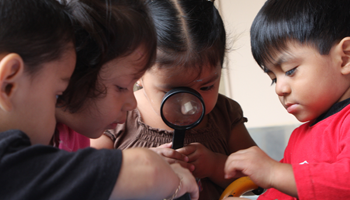
Policy/Trends
Associations, organizations promoting knowledge, information and best practices, research based organizations and newsletters on topics related to early education, child care and disability topics for children birth to age 21 are found here.
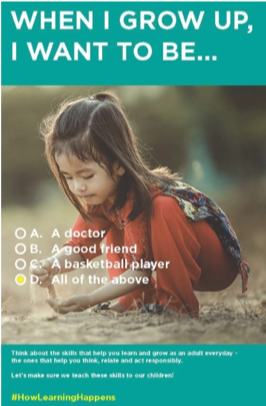
This article discusses a longitudinal study based on a statewide preschool for low-income children in Tennessee. It showed surprisingly negative results. Possible reasons for the results have implications for all preschools.
- Multimedia: Waves for Change (in Early Childhood)
The Alliance for Early Success is a catalyst for bringing state, national, and funding partners together to improve state policies for children, starting at birth and continuing through age eight.
- Tuesday's with Liz: Sara Luterman
Published on Mar 14, 2016 This week Liz Weintraub, AUCD's advocacy specialist and host of Tuesdays with Liz: Disability Policy for All, interviews Sara Luterman, AUCD program assistant, on how to include people with autism in the workforce. - AUCD Diversity and Inclusion Toolkit
The Developmental Disabilities Assistance and Bill of Rights Act of 2000 (administered by the Administration on Intellectual and Developmental Disabilities or AIDD), the Division of Maternal and Child Health (MCH) Workforce Development Strategic Plan for 2012-2020, and the 2015-2016 Strategic Map for the Association of University Centers on Disabilities (AUCD) all address elements of diversity, equity, inclusion, and cultural competence. This Diversity and Inclusion Toolkit provides concrete objectives, strategies, and resources to help these audiences realize their goals in this area. It also provides a foundation for future efforts, including developing a blueprint for AUCD's network to collectively make progress in diversity, inclusion, and cultural and linguistic competence.

- Brain Hero In 2009, the Center launched a collaboration with the Interactive Media Division of the School of Cinematic Arts at the University of Southern California to develop and test new ways of communicating the science of early childhood development using interactive media. The "Brain Hero" video, depicting how actions by a range of people in the family and community impact child development, is the first product of this collaboration. This 3-minute video adapts the visual sensibility of interactive game models to a video format.
- Interactive Features: Key Concepts in the science of early childhood development made simple These Web-based interactive features describe and explain key concepts in the science of early childhood development and early childhood program evaluation research. Using an easy-to-follow slideshow format, these features illustrate core scientific concepts as how early experiences shape brain architecture, the importance of early childhood to the learning, behavior, and health of later life, as well as the relevance of program evaluation research to policy decisions.
- Preschool Inclusion: Key Findings from Research and Implications for Policy (April 2016), highlights research on preschool inclusion relevant to the following three questions:
- What are the effects of inclusive preschool on children's early learning and development?
- What is known about the quality of inclusive preschool programs?
- What is known about how to improve the quality of inclusive preschool?

- Using Policy to Create Healthy Schools Mar 2019 As part of the Robert Wood Johnson Foundation’s Together for Healthy and Successful Schools Initiative, Child Trends partnered with the Institute for Health Research and Policy at the University of Illinois at Chicago and EMT Associates, Inc. to review relevant state statutes and regulations enacted as of September 2017 and analyze their alignment with the Whole School, Whole Community, Whole Child (WSCC) model of healthy schools. The WSCC covers 10 domains: health education; physical education and physical activity; nutrition environment and services; health services; counseling, psychological, and social services; social and emotional climate; physical environment; employee wellness; family engagement; and community involvement. Findings from this work are compiled in three products to help policymakers and advocates better understand the current landscape and consider the creation of policies that promote healthy schools:
- Supporting the Psychological Well-Being of the Early Care and Education Workforce: Findings from the National Survey of Early Care and Education July 2018
- Parent Knowledge Among First Time Parents of Young Children July 2018
-
Additional Resources from Child Trends
- Supporting Children and Parents Affected by the Trauma of Separation June 2018
- The prevalence of adverse childhood experiences (ACES) nationally, by state and by race or ethnicity Feb 2018
- Three videos demonstrating the needs of very young children for healthy development (Videos) July 2018
- A State Multi-Sector-Framework for Supporting Children and Youth with Special Needs July 2018 According to the 2016 National Survey of Children’s Health (NSCH), over 19 percent of children in the United States from birth through age 17 are children and youth with special health care needs (CYSHCN). As this diverse group experiences (or may be at increased risk for) chronic physical, developmental, behavioral, or emotional health conditions, they rely on a wide range of supports to meet their health, education, employment, and other needs. However, gaining access to such supports can be a complex challenge for families as they navigate different health insurance and financial assistance programs; coordinate health services across primary care physicians, specialty care providers, and schools; and seek services that support inclusion in education programs, the workforce, and the broader community as young people transition into adulthood. This report describes the current status of services for this population and suggests a framework for improving access to services and supports.
- 5 Questions Families Should Ask About School Discipline Sept 2017
- Understanding and Addressing the Early Childhood Origins of "Mean" Behavior and Bullying: Resources for Practitioners
This Research Brief is based on the longer report: Bullies in the Block Area: The Early Childhood Origins of "Mean" Behavior. This brief first provides a summary of the developmental trajectory to bullying behavior and theories about social and environmental contributors to bullying. The remainder summarizes promising strategies and evidence-based intervention models designed to prevent bullying by addressing factors that contribute to the development of "mean" behavior and aggression in early childhood. - Five Ways Trauma Informed Care Supports Children's Development
This news bulletin describes childhood trauma and explains the importance of trauma informed care (TIC) as providing a common language to support children who have been exposed to trauma. It includes links to resources and provides information helpful to parents and everyone who works with children.
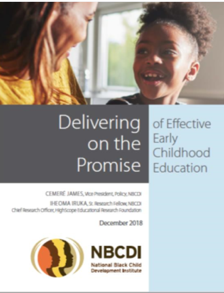
- Resources within Reason Resources Within Reason is a bi-monthly, one-way listserv. Each issue focuses on a topic of interest to individuals who support young children and their families, with emphasis on children with or at risk for disabilities. All featured resources are free. The content of Resources within Reason is coordinated by Camille Catlett. The listserv is supported by DEC. All or part of Resources within Reason may be freely shared or copied.
- Recommended Practices: A Comprehensive Guide for Practical Application in Early Intervention/Early Childhood Special Education A DEC initiative that bridges the gap between research and practice, offering guidance to parents and professionals who work with young children who have or are at risk for developmental delays or disabilities.
- Starting Early: Education from Prekindergarten to Third Grade Journal Vol 26 Number 2 | Fall 2016
The latest issue of the journal, conveniently available for free download at the link above, addresses the importance issues around education for children from pre-kindergarten to third grade. You may be interested in the entire journal. Two of the eleven articles that specifically address special needs are:
- Supporting Young Children with Disabilities by Kathleen Hebbeler and Donna Spiker
- Supporting Young English Learners in the United States by Lisa Barrow and Lisa Markman-Pithers
Early childhood education experts say that the type of program you choose is less important than key factors like how teachers interact with students, whether the space is specifically designed for young children and whether learning is play-based and culturally responsive.
The Infant Development Association of California (IDA) is a multidisciplinary organization of parents and professionals committed to optimal developmental and positive social and emotional outcomes for infants, birth to three, with a broad range of special needs and their families. IDA advocates improved, effective prevention and early intervention services while providing information, education, and training to parents, professionals, decision makers, and others.
-
Additional Resources from IDA
- Public Policy The public policy committee keeps the organization informed about and involved in the public policies and analyzes pressing policy issues related to laws and regulations, communicates key findings and program performance results, and makes recommendations to the organization for appropriate actions in the form of strategies to ensure quality outcomes.
- Webinars on the social and emotional development of young children
- IDA/MAP Webinar Series
"Ideas Worthy of Replication," hosted by the Interdisciplinary Collaborations for Quality Committee of the Infant Development Association and co-sponsored by the Infant Development Association and the MAP to Inclusion and Belonging Project of WestEd Center for Child and Family Studies. The goals of this webinar series are to bring attention to quality trainings and programs rooted in the concepts and knowledge areas of the California Competencies documents including: - IDA/MAP Webinar Series Recordings
This series will inspire others to develop similar programs or training to make them more accessible to others throughout the state. Each recording last just under an hour.- Caring for Parents: Elements and Models of Support Recorded: 04/07/2014
- Mindful Leadership: Leading with You in Mind Recorded: 11/13/2014
- Talking to Parents When Conerns Arise Recorded: 05/19/2015
- Supporting Young Children's Behavior: The Hourglass Model Recorded: 10/13/2015
- Tips for Supporting and Communicating with the Nonverbal Child
Recorded: 5/26/2016
- Transforming the Workforce for Children Birth Through Age 8: A Unifying Foundation
The Institute of Medicine (IOM) and National Research Council (NRC) were commissioned to explore the implications of the science of child development for the professionals who work with children birth through age 8. In the resulting report, Transforming the Workforce for Children Birth Through Age 8: A Unifying Foundation, the committee finds that much is known about what professionals who pro¬vide care and education for children need to know and be able to do and what professional learning supports they need. However, that knowledge is not fully reflected in the current capacities and practices of the workforce, the settings in which they work, the policies and infrastructure that set qualifications and provide professional learning, and the government and other funders who support and oversee these systems. The report offers recommendations to build a workforce that is unified by the foundation of the science of child development and early learning and the shared knowledge and competencies that are needed to provide consistent, high-quality support for the development and early learning of children from birth through age 8. 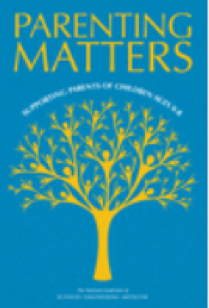 Parenting Matters: Supporting Parents of Children Ages 0-8
Parenting Matters: Supporting Parents of Children Ages 0-8
Parenting Matters: Supporting Parents of Children Ages 0-8 reviews research on parenting practices and identifies effective practices. The report, sponsored by a collaborative of federal agencies and highly respected private foundations, also recommends ways agencies and others can support interventions that help more parents learn about effective parenting practices.
This 386 page publication is free to download in its entirety or by chapter. You may be interested in Chapter 5, Targeted Interventions Supporting Parents of Children with Special Needs, Parents Facing Special Adversities and Parents Involved with Child Welfare Services.

- Every Child Belongs: Welcoming a Child with a Disability May 2019
- 10 Things Every Parent Should Know About Play Oct 2018
- 12 Ways to Support Language Development for Infants and Toddlers
- Top 10 No Cost Toys for Infants Toddlers and Preschoolers
- Ideas for Bringing Humor to the Classroom Humor reflects our joy. And for children and adults alike, it's a wonderful way of reducing stress. Humor helps put things in perspective. Encouraging children to see the humor in life is one of the greatest gifts you can give them. You will be enriching their spirit as well as making learning fun. You and the children can enjoy these activities together.
-
Additional NAEYC Resources
- The Word Gap: The Early Years Make a Difference A recent study shows that children's vocabulary skills are linked to their economic backgrounds. This article explain the study and give 9 recommendations for early care and education providers on how they can close "the word gap".
- Position Statements including the DEC/NAEYC Joint Statement on Early Childhood Inclusion
- The First Step for Addressing Bias is Infant and Toddler Programs, Young Children, November 2017
- Moving Beyond Anti-Bias Activities: Supporting the Development of Anti-Bias Practices
- Cultural Competence Quality Rating and Improvement Systems (QRIS) Implementation
- Engaging Diverse Families Engaging Diverse Families (EDF) is helping early childhood education programs effectively engage diverse families. Our goal is to learn how excellent early childhood education programs are effectively engaging diverse families and to share what we learn with other programs struggling to start and sustain family engagement practices.
- I Dream of the Day Isauro Michael Escamilla, M.A., an Early Childhood Education Teacher Researcher from the San Francisco Unified School District, spoke at the closing session of NAEYC's Institute for Professional Development in San Francisco this year. Here is a particularly moving excerpt.
- The Word Gap: The Early Years Make a Difference A recent study shows that children's vocabulary skills are linked to their economic backgrounds. This article explain the study and give 9 recommendations for early care and education providers on how they can close "the word gap".
- Position Statements including the DEC/NAEYC Joint Statement on Early Childhood Inclusion
- Big Body Play: Why Boisterous, Vigorous, and Very Physical Play Is Essential to Children's Development and Learning A book on encouraging physical activity for children, by Frances M. Carlson.
- Increasing Children's Physical Activity (PDF)
- Our Collection of Children's Songs
- 10 Ways Baby's Learn When We Sing to Them Listening skills, new words, and so much more
- Playing with Music at Home Tips to explore music and connect it to children's learning
- Public Policy Overview NAEYC promotes national, state and local public policies that support a system of well-financed, high quality early childhood education programs in a range of settings, including child care centers, family child care homes, and schools.
- Promoting Social–Emotional Development: Helping Infants Learn About Feelings (PDF) Starting from birth, infants begin learning how to make sense of their world through interactions with caregivers. Responsive caregiving-which involves caregiver reflecting and validating a child’s feelings and behaviors-help very young children makes sense of their world. Over time, children who have this type of nurturing, reflective care better regulates their emotions.
- 10 Tips for Raising a Compassionate Toddler Recent research shows that infants and toddlers are far more empathetic than we once thought. While they have short fuses, and don’t cope well with sharing, they are capable of being compassionate. With this in mind, here are ten tips I use in the classroom to help infants and toddlers become pro-social that families can also try at home.
- NAEYC Radio NAEYC and BAM Radio Network partnered to bring NAEYC Radio. The program was developed to bring the best and latest insights on early childhood education directly to parents and educators.
- 10 tips for Raising a Compassionate Infant Toddler
- Helping Infants Learn About Feelings (PDF)
- Standing Together Against Suspension and Expulsion Joint Policy Statement (PDF)
A group of more than 30 national organizations recently published a joint statement, Standing Together Against Suspension and Expulsion in Early Childhood: A Joint Statement (April 2016), which supports the recommendations from the U.S. Departments of Education and Health and Human services in their December 2014 Joint Policy Statement on Expulsion and Suspension. The organizations have also compiled a number of related resources to help states, districts, communities, and classrooms prevent, limit, and ultimately eliminate suspension and expulsion in early childhood education. - Caring Relationships: The Heart of Early Brain Development By Ron Lally and Peter Mangione
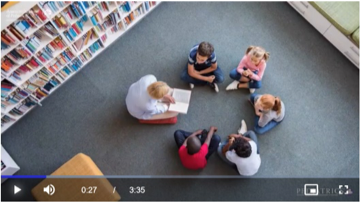
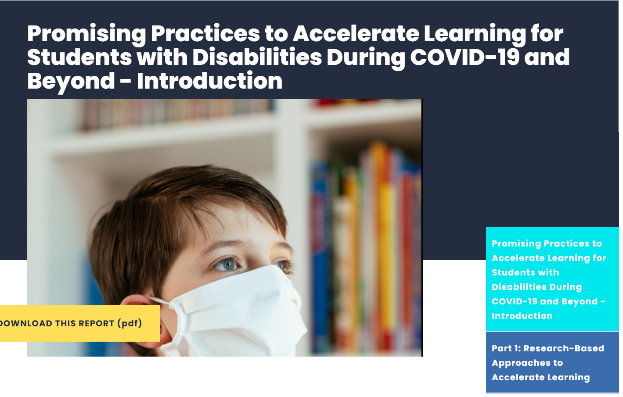
It is critical that schools take immediate steps to address the issue of instructional loss and prevent students from falling further behind. NCLD released a guide that outlines key principles to help shape inclusive and equitable learning opportunities for all students in the 2020–2021 school year.
- Early Childhood Expulsions and Suspensions Undermine Our Nation’s Most Promising Agent of Opportunity and Social Justice- September 2016 Issue Brief by Walter Gilliam, PhD
Presents the latest information regarding early childhood expulsions and suspensions, with a focus on gender and race disparities. Looks at how these disparities violate the civil rights of many young children of color in the U.S. and contribute to the nation's costly achievement gap. - Unequal Access: Barriers to Early Childhood Education for Boys of Color –August 2016 Issue Brief by Child Care Aware
Discusses barriers to accessing quality early childhood education for boys of color (high costs; insufficient availability of free or subsidized programs; and implicit biases, which consistently send boys of color negative messages about their behavior, identity, and future) and discusses possible solutions to these issues.
A new study by researchers at five universities found that babies born during the pandemic may have lower IQ scores than those born before it. Babies who came into the world before the coronavirus had a cognitive score hovering around 100, according to this study. But the test scores of babies born during the pandemic fell sharply, to around 78. That’s 22 points lower than what’s considered normal.
The trouble is that babies may not be getting enough of the crucial “serve and return” interactions that help shape brain architecture, experts say. When an infant babbles, gestures or cries, and an attentive adult responds with words, or touch, neural connections are built and reinforced in the child’s brain. This back-and-forth exchange helps build foundational neural connections that drive child development.
“We can’t be cavalier about this,” Deoni said. “What this means is that we really have to redouble our efforts at ensuring kiddos are able to get out and play as well as spend time with their parents.”
Briggs, for one, believes one of the best ways to help children may be to help their parents. She hopes to raise awareness that stress management is more a necessity than a luxury as the public health crisis drags on.
Being an effective teacher is about more than just improving test scores—it’s also about making a difference in students’ lives. When we asked our readers to describe the traits of a life-changing teacher, they said that great teachers make their students feel safe and loved, possess a contagious passion for learning, believe their students can succeed—and always know when to be tough to help students reach their full potential.
This article presents 8 recommendations based on current research for how to be an exceptional teacher who truly makes a difference in the lives of their students.
- Public Policy Center A research based, nonpartisan program that brings the voices of babies and toddlers to public policy. They offer the opportunity to join the Public Policy Network and the e-newsletter, The Baby Monitor.
